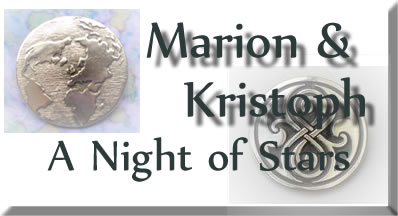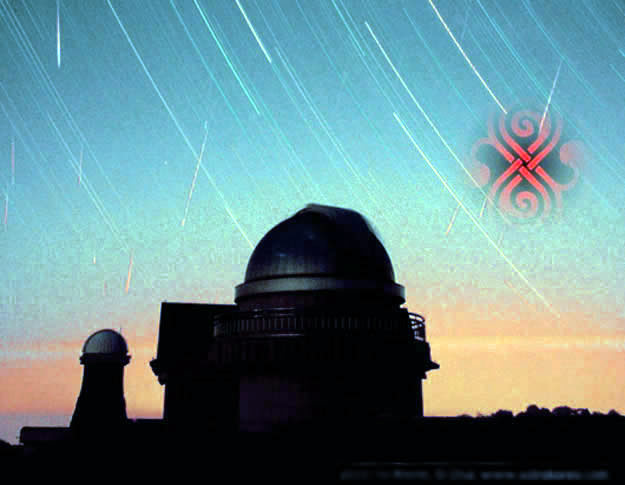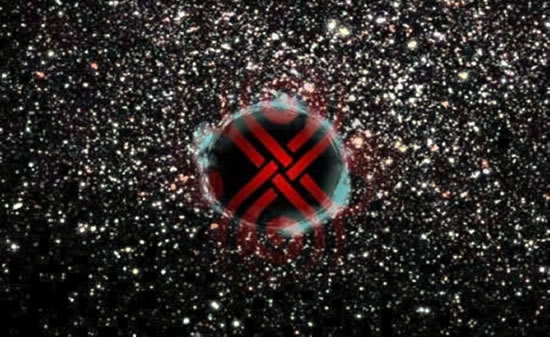

It was a warm spring evening on the southern plain, but Marion and Rodan dressed in velvet and brought lapin-lined hooded coats usually only worn in winter as they stepped aboard the Presidential transporter. Aineytta and the former Lord de Lœngbærrow were already aboard. So was Lady Lily and Kristoph’s Aunt Thedera and her husband, Lord Máscaentan. Naturally there was a full complement of Presidential Guards, too, but they were in the forward compartment, not the President’s lounge where they had comfortable chairs and tables and were served cool drinks as soon as the transporter took off.
Marion regretted that the shields covered the windows soon after the journey began, but the transporter was travelling so fast it would be uncomfortable to try to look at the view. Inside the compartment stabilisers masked the sub-sonic speed and there was only a faint vibration in the floor. Soft music played and there were images on a screen of the northern polar region they were visiting tonight.
“I have read about it, of course,” Marion said. “And I’ve seen maps. But this is my first time visiting the polar region in all the time I’ve lived on Gallifrey.”
“I’ve never been before, either,” Lily told her. “It is hardly a great social centre most of the time.”
“I have,” Thedera said. So did Aineytta. They both smiled knowingly. They had regularly visited the polar caldera ever since they were young women. The observatory there was Chrístõ de Lún’s second favourite place after the Great Observatory in Athenica. He had often taken his sister and wife to see it. He had taken his first born son to see its wonders, too. But since retirement he had been content to stay on the southern continent much of the time.
But this was a special occasion and the oldest and most revered astronomer on Gallifrey was coming out of retirement for one night only. He smiled broadly and answered all of Marion’s most enthusiastic questions about their destination.
“The Caldera lies on the place where the old Citadel of Rassilon once stood,” he said. “The first great city of Gallifrey. It was destroyed millennia ago. Mount Cadon erupted, blowing the top half of the mountain to rubble and covering the whole area with ash and debris and molten lava, and as if that wasn’t enough, the emptying of the caldera that lay directly below the Citadel caused it to collapse.”
Marion looked distressed by the story. Her father-in-law was puzzled at first, especially when he caught some of the images in her mind. She had been thinking of ancient Pompeii where the whole population had been killed by the ash and their bodies buried beneath the debris from Vesuvius.
“No, no, we were not so foolish as that,” he assured her. “The eruption was predicted long before and the Citadel was evacuated. Not even a tafelshrew was left behind. Only empty buildings were destroyed. Fine, beautiful buildings according to contemporary paintings, but just bricks and stone when all is said.”
“Oh, I am glad to hear that,” Marion said. “I’ve always felt very sad about what happened in Pompeii, even though it was centuries before my own time. It’s good to know that everyone was saved from the old Citadel.”
Kristoph smiled. He had often remarked that Marion had a romantic heart. It would have spoiled this evening for her if she had thought that she was visiting a scene of ancient tragedy.
It was necessary to put on the warm coats before they emerged from the climate-controlled cabin of the transporter. They all, male and female alike, wore special veils over their faces, too. They were opaque on the outside, but the fabric was completely transparent from the inside. They kept out the bitter cold of the polar circle in its eternal winter.
“How can it be eternal winter here?” Marion asked. “Doesn’t it work like the poles on Earth, one being in constant light and the other in constant dark for half the year, then the other way around?”
“This is Gallifrey,” Kristoph answered her. “The reasons are complicated. It is quite remarkable at the edge of the circle. Within half a mile the baking Red Desert becomes this dark, frozen tundra. There used to be a few mining communities in that transition zone, taking advantage of the precious minerals in the rocks, but we have no need to compel men to live in such deprived areas these days. We even closed the prison camp that was based there. It was too cruel even for hardened criminals.”
The dark place at the magnetic pole, deep within the circle had a strange kind of beauty, Marion admitted. The broken, jagged Mount Caden rose up against a burnt brown sky full of bright silver stars. Before it was a huge lake that long ago filled the deep, wide depression left when the citadel collapsed into the caldera. The water was almost frozen solid and chunks of ice rested on the surface.
Marion shuddered with the thought of what would happen to anyone who fell into that lake. But the Presidential party kept a safe distance from it. They walked a short way along a torchlit path to a hydraulic funicular that carried them up the side of Mount Caden.
The observatory was built on top of the mountain. The long extinct volcano had cooled leaving a solid platform upon which the building was perched. The rounded dome was copper-red and the walls the rust-red of the frozen rocks of this region.
Inside it was pleasantly warm. The veils and hoods and lapin-lined coats could come off and the lords and ladies in their finery were escorted to the auditorium. Kristoph took his mother’s arm and his wife walked in company with lady Lily as his father went off in a different direction to prepare for the presentation.
This was what it was all for. Marion looked up at the inside of that dome she had seen from the outside. She was only slightly surprised to find that it was transparent from this side and it was possible to see every star in the hemisphere through it. But when she looked carefully at an individual star or a constellation of them, labels appeared giving their names and all the details of their distance from the Gallifreyan solar system, their magnitude and many other figures that Marion really didn’t understand fully.
It was utterly fascinating, anyway. She relaxed in the reclining chair and watched the stars while soft music played.
Then it was time for the presentation. Chrístõ de Lún de Lœngbærrow looked magnificent in a black and gold robe and headdress. He stood on the podium with two other men either side, Lords Anvul and Bernia, the chief astronomers who worked here at the polar observatory. They looked quite in awe of the great man himself as he spoke about the exciting experiments that had been going on now for more than three millennia and had finally come to fruition.
“When I was elected the youngest ever Astronomer General of Gallifrey, it was my ambition to penetrate the black hole Omega and discover what lay beyond it,” he told his audience. “Several times in my career I hoped that probes sent into Omega would send back images that would answer the question once and for all. But none of them survived the journey. When I retired, I passed the quest on to these two able men of science who continued to search for ways to break what must be acknowledged as the last frontier of stellar exploration. And I am proud to say that they have done it. I am honoured to hand over the podium to Lord Anvul who will show this audience of invited guests from among the great Houses of Gallifrey this latest addition to our collective store of knowledge.”
There was a ripple of applause as Chrístõ de Lún stepped down and Lord Anvul stepped forward. Perhaps he was far less accustomed to public speaking, because he looked nervous and hesitated before beginning his presentation.
The seats reclined again as he spoke, and the view of the stars beyond the dome dissolved into a black starfield in deep space before revolving to show one of the most magnificent but dangerous objects in space – a black hole. It looked very much like a black sun with a blue-yellow corona around it formed by the dense clusters of stars being drawn towards it. This was a monster that could swallow whole systems over millions, billions of years, pulling them towards the singularity.
All attempts to send physical probes through the black hole had failed. Anything of actual mass, made up of molecules and atoms, was destroyed. The best efforts had given only the smallest clues about what lay beyond the event horizon.
But shortly before Chrístõ de Lún retired experiments had begun with non-physical probes, made up of light beams fired from an artificial satellite that could hold a safe orbit outside the gravitational pull. It took another thousand years for his successors to make it work.
And now, at last, they were ready to present their findings to the assembled VIP guests. There was a ripple of excited murmuring all around the hall as the images from the light probe appeared on the dome. Looking at it was like actually travelling into the black hole. At first there was pure black darkness. Marion heard Rodan murmur slightly, breaking the awe-struck silence. Then there were colours, amazing, fantastic colours, some of them never seen in the ordinary spectrum of light, in an amazing living kaleidoscope.
Then the image widened out into a vast, endless cosmos of fiery light. Within it, stars were being created, with planets orbiting them. A new universe, beyond the one they knew, was forming. The universe of anti-matter that no being from this universe could possibly survive in, but a universe nonetheless, a place where life of infinite kinds might come to exist, and might one day wonder what lay beyond the singularity and send probes to find out.
“It seems probable that the matter drawn into the singularity is converted to anti-matter and feeds this proto-universe,” Lord Anvul said. “There is evidence to support such a conversion process taking place. These new stars and new worlds are being created from the matter of dying stars from our universe.”
There were murmurings among the guests as they considered that amazing notion. It had always been believed that matter and anti-matter were two very different entities. If it was possible for one to become the other, then it was a whole new scientific enterprise.
So Lord Anvul said and he received a resounding round of applause for that. It was clear that he had no practical application for these discoveries. Nobody would be attempting to reach the anti-matter universe. They would not be trying to make contact with sentient life in that realm. There was no need to find new sources of energy or the cure for some disease in order to make so many thousand years of research worthwhile. It was purely an achievement for its own sake.
But that was perfectly all right. On Gallifrey knowledge for its own sake was valued. That was yet another wonderful thing that Marion realised tonight about the world she had made her home.
“Kristoph,” she whispered, gripping her husband’s hand in the dimly lit auditorium where nobody would notice such an intimate gesture. “If I ever forget it… let me tell you now… I am glad you brought me here to Gallifrey. It is a wonderful planet.”
“I’ve always hoped you thought so,” Kristoph answered.

 |
 |
 |